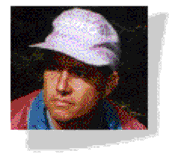 Dickie Selfe, Research Editor
Dickie Selfe, Research EditorHome Page: http://www.hu.mtu.edu/~rselfe/
Email: rselfe@mtu.edu

 Dickie Selfe, Research Editor
Dickie Selfe, Research Editor
Home Page: http://www.hu.mtu.edu/~rselfe/
Email: rselfe@mtu.edu
Greetings from the Research section of Academic.Writing. As was the case with my last column, I would like to feature a single institution and its CAC-related activities, programs, and strategies as well as some of the pre-published research efforts emerging from that effort. In this case, I'm focusing on work taking place close to home (my home, that is)--in the Upper Peninsula of Michigan.
In 1999, the Humanities Department at Michigan Technological University--specifically those of us interested in incorporating electronic communication activities across the curriculum--were lucky enough to have caught the attention of Kristine Paulsen, a local school district technology coordinator. Paulsen had obtained funding for a large project that has allowed us--Dànielle DeVoss, Michael Moore, myself, and a number of other faculty, graduate students, and undergraduates--to set up an electronic communication across the curriculum (ECAC) workshop for local K-12 teachers across the rural central Upper Peninsula of Michigan. As we've worked on the workshop, which we have conducted once and will conduct again this June, we have experimented with a combination of face-to-face and online learning experiences.
In our third CAC Program Report, we report on the status of this workshop and consider its implications for ECAC work at all educational levels. Some of the findings that we describe in the report are the result of what we might better term an "exploration." Besides providing the teachers with a technology-rich, communication-oriented professional development experience, we are trying explore questions that need to be addressed and approaches that seem appropriate in a rapidly changing system: the schools themselves are changing, the demographics of this rural area are dynamic, and the technology itself is in constant radical transformation. With this type of shifting environment, we believe it is appropriate, in a research column in Academic.Writing, to "explore" what seems to be the primary questions we face in our efforts to make ECAC a viable and adoptable approach in all learning institutions. Not only do our preliminary observations seem appropriate for K-12 educators and their expectations for professional development activities, but these observations are also readily applicable to ECAC experiences developed for college educators. Our third CAC Program Report, then, is a description of the fundamental approaches we applied to the first ECAC summer workshop as well as some surprising events that now inform our thinking and planning for the next summer workshop.
In addition to reading the project report, you can learn more about this project by visiting the wonderful Web site Dànielle DeVoss has created for this summer's event http://www.hu.mtu.edu/ecac and the NorthWoodsMOO, an online support environment developed under the leadership of Michael Moore. The NorthWoodsMOO is an educational Encore MOO. It is available through a Java-compatible browser at http://www.hu.mtu.edu:8000 and through other MOO clients at http://www.hu.mtu.edu:7700.
Publication Information: Selfe, Dickie. (2001). CAC Research: Editor's Comments, May 2001. Academic.Writing. https://doi.org/10.37514/AWR-J.2001.2.1.16
Publication Date: May 15, 2001.
DOI: 10.37514/AWR-J.2001.2.1.16